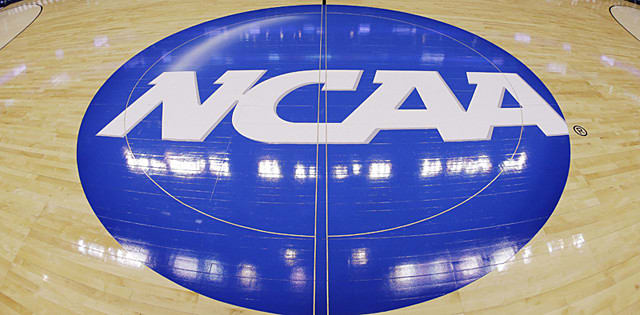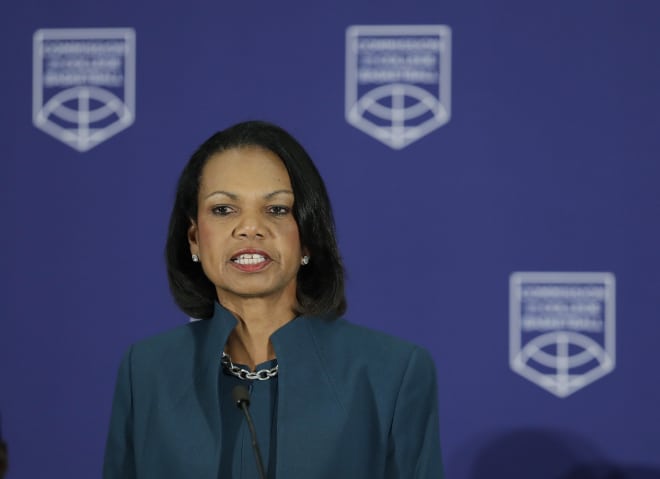Five takeaways from Commission on College Basketball Report

The Commission on College Basketball chaired by Condoleezza Rice announced their findings and suggestions on how to improve corruption in college basketball on Wednesday.
I'm not sure the recommendations of Rice and the committee are going to cause any real or immediate change to the recruiting landscape, but I guess it is a start. After listening Rice's comments in the press conference reading through the document that accompanied it, here are five major takeaways.
MORE: Who boosted stock during live period? | Evans' Twitter Tuesday mailbag
THE VERY FIRST RECOMMENDATION WAS TO CHANGE SOMETHING THE NCAA HAS NO CONTROL OVER
"The Commission calls on the National Basketball Association (NBA) and the National Basketball Players Association (NBPA) again to make 18-year-olds eligible for the NBA draft, so that high school players who are drafted may proceed to the NBA. The NCAA lacks the legal power to change one-and-done on its own; the power to make this change lies exclusively with the NBA and the NBPA."
For the record, I agree that the NBA needs to make the one-and-done rule go away. It's time to quit the charade of players who have no intention of getting a real education going to college. At this point, some are barely even stepping foot on campus and spending their year -- which is more like 6-9 months -- in school taking online classes and spending as little time in real classes as possible.
However, it amazes me that the first recommendation of the commission is to call for change to a rule that they acknowledge having zero control over. If this is the chief recommendation -- and since it was discussed first I have to assume that it was high up the commission's list -- then it would have been reasonable to have included discussion with the NBA and NBPA on this and provide some insight into how the NCAA can work together with the NBA to try and implement this change. I did not hear or read anything that covered that.
ALLOWING PLAYERS TO RETURN TO COLLEGE IF THEY GO UNDRAFTED IS THE RIGHT MOVE

"The Commission recommends that high school and college players who declare for the draft and are not drafted remain eligible for college basketball unless and until they sign a professional contract."
This is a great suggestion. It's something that should have been in place for quite some time and should be fairly easy to implement.
I understand that there will likely be some paperwork and roadblocks when it comes to determining whether any player who entered the Draft and didn't get picked benefited from extra benefits along the way. Figuring out how somebody attended workouts, paid for training and other things could be tricky. But, overall this is a great step in the right direction and judging by the tone of the commission, it sounds like they would like to see this implemented immediately.
Now, there are going to be many college coaches that don't like this. There are already several complaints about too many players "testing the waters." and handcuffing coaches in recruiting as they try to figure out scholarships. Having to now wait until late June instead of the latter part of May to see who is returning to school could be problematic. But, overall this is a positive suggestion and would be a good step to take.
The commission also discussed the standardization of funding degree completion. This is another great suggestion. The truth is that many schools already have programs in place for student-athletes who leave early for the pros to come back and finish their degrees or for those who can't finish in four years to receive assistance beyond their scholarships. However, not all do. Calling for funds to be set aside to allow for degree completion and standardizing it has to be seen as a positive.
OUTSOURCING INVESTIGATIONS AND IMPLEMENTING GREATER PENALTIES COULD DETER RULE BREAKERS
"The Commission recommends that the NCAA create independent investigative and adjudicative arms to address and resolve complex and serious cases (hereafter “complex cases”) involving violations of NCAA rules."
One of the biggest complaints with the NCAA is that they are a mostly toothless organization when it comes to investigating rules. Because of that, a culture has been created where schools and coaches believe that the benefits of bending the rules far outweigh the dangers of getting caught.
Why this is only being discussed in regards to college basketball is another discussion for another day, but calling for outside and independent investigation seems like a no brainer and the hope is that the NCAA really does this. After all, the NCAA is comprised of the schools that make it up. What incentive is there to take down their own cash cows? If any meaningful change is going to happen, using independent investigators and seeking outside counsel seems like a smart way to go.
Implementing punishments with actual bite is another great step. Rice discussed leveling penalties up to and including five-year bans from the postseason for level one (major) violations. She and the commission also called for great penalties to be administered to programs who employ coaches or administrators who have broken rules elsewhere and get caught again.
Acknowledging that there are issues here and changing how rule-breakers are investigated and punished is a big step. Right now, coaches are simply asking if the juice is worth the squeeze when it comes to skirting NCAA rules and often they are deciding the juice is worth it. Start taking some coaches and administrations down with real penalties and we could start to see some change.
ASKING FOR GREATER TRANSPARENCY WITH APPAREL COMPANIES ONLY WORKS IF NCAA WILLING TO DO THE SAME
"In the near term, the Commission recommends that the NCAA promptly adopt and enforce rigorous criteria for certifying the non-scholastic basketball events that its coaches attend. In order for the NCAA to certify a non-scholastic basketball event, the owners, event operators, sponsors, and coaches for the event must agree to financial transparency about all events they run, including those that are not certified by the NCAA."
Whoa. This is pretty bold.
Essentially, the commission is asking, perhaps even demanding, that event operators and apparel companies open up their books in order to receive certification. They want to know what money is being spent to run events and sponsor teams. They want to be able to know exactly what was spent to finance travel by teams and feed their players and things of that nature.
I'm really not sure how they are entitled to that. Are they going to open up their own books to all of us so that we can see how they are spending the millions of dollars that big-time college athletics and basketball bring to the NCAA? I seriously doubt it.
Look, it's good to have some standardization and oversight in place for NCAA-approved recruiting events in April and July. But the NCAA would be over-stepping things a bit here. Ultimately, there's a longer play in effect here and that gets me to my final takeaway.
THIS ALL LOOKS LIKE A SETUP TO MOVE JULY RECRUITING IN HOUSE
"With respect to the longer term, the Commission recommends that with a goal of 2019, the NCAA work with USA Basketball, the NBA and the NBPA and others to establish and administer new youth basketball programs."
Now we've gotten to the meat and potatoes of the matter. What Rice and the commission have essentially concluded is that the NCAA and a few other select entities take over the month of July and the live periods that it includes. The section I'll quote next makes it pretty clear.
"Briefly, the Commission proposes that youth basketball players be identified and developed at three levels: Level 1, players with National Team potential; Level 2, players with Highest Collegiate potential; and Level 3, players with Collegiate potential. At each level, players would have to be identified, developed and evaluated by appropriate stakeholders. Critically, that development would include not only basketball, but also academic and life skills, health and collegiate eligibility. One centerpiece of this program would be NCAA-administered regional non-scholastic basketball events in July that NCAA coaches would exclusively attend."
This is all a nice way of saying that the NCAA wants their cut of the summer basketball pie. I can't even begin to describe the mess that deciding those levels of prospects would be. People think there are politics involved in rankings? Imagine the potential mess of the NCAA determining which prospects get to attend which events?
My real issue with the commission is this, though. How can they be recommending changes to events that they have never been to. The commission was formed in October and the findings were released today. Since then, last weekend's live evaluation period was the only time that these events they are seeking to change -- at least the ones that college coaches can attend -- have taken place. The members of the commission weren't out and there certainly wasn't enough time to have real discussion about what they did or didn't see.
Ultimately, what I see is some fairly tough talk that boils down to a message that I see being this; "Look shoe companies, you can still have your events. But we want to know exactly how much you are making and spending on them so that we can see how profitable they are and make a decision about whether or not we want to take them over."